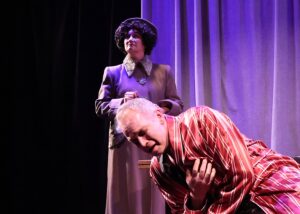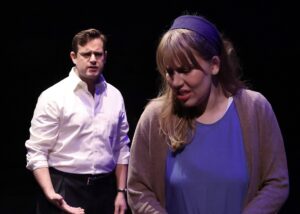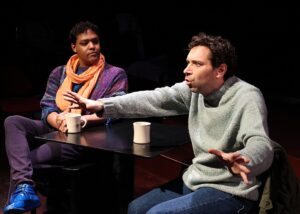It’s hard to imagine now how different the worldview of the gay male community was in New York in 1985, when the city was the epicenter of the HIV-AIDS epidemic. The vast majority of Americans afflicted with the disease at the time were gay men who got it through sex and drug addicts who got it from infected needles, and the feelings of guilt and shame associated with it were intense. Christian fundamentalists saw AIDS as the judgment of God. It was almost always fatal. Those who were dying from it — in grotesque and horrible ways — were often abandoned by their families or too afraid to tell them what they were enduring.

New York in 1985 is also the setting for Tony Kushner’s two-part play Angels in America. The first production of Part One: Millennium Approaches was in 1991; then, in 1992, came Part Two: Perestroika. Both parts premiered on Broadway in 1993 (Millennium Approaches won the Pulitzer Prize for Drama and the Tony for Best Play). By that time, the number of AIDS funerals was staggering. The protease inhibitor “cocktail” that successfully treated the disease would not arrive until 1996.
I saw both parts on Broadway in 1993, and the experience in that historical context with characters railing against their circumstances was transformative. It’s hard for any new production to live up to that. Even Mike Nichols’s star-studded 2003 HBO miniseries version didn’t have the same emotional punch.
But now, David Drake has brought Kushner’s masterwork to the Provincetown Theater, with Millennium Approaches performed by local actors with extraordinary grace and power. It’s a privilege and a gift to behold — and thrilling in its own right.
To begin with, Drake and his superlative scenic designer, Ellen Rousseau, do not construct a towering edifice onstage, which they have done in the past to great effect (in August: Osage County and Sweeney Todd). Instead, they leave the stage mostly bare, with raised platforms on either end. Then they give theater-in-the-round a subversive twist: the stage crosses the theater horizontally, with seat risers in the front and back, sliced into four by exit/entrance pathways. The resulting swirl of scenes and characters is fluid, intimate, and a tad disorienting, which fits.
Three narratives crisscross in the play. At its heart is Prior Walter, the descendant of an illustrious American Wasp family who is violently ill with AIDS. His boyfriend, Louis Aronson, is an underemployed Jewish intellectual who lacks the courage to deal with Prior’s tragedy. The main story is how Louis abandons his partner when Prior needs him most.

Prior is played by Todd Flaherty, who previously appeared in Provincetown Theater’s production of The Glass Menagerie as Tom and is the writer-director-star of the drag film Chrissy Judy. Flaherty is a low-key Prior, and he gives the role an impish charm. Louis, who is a stand-in for Kushner himself, is played by Karl Gregory with just the right whiny, tormented edge. Louis is a guilt-ridden blowhard who yacks political philosophy. He’s afraid of drawing conclusions, in ideas and in life.
The second narrative is about Mormons from Salt Lake City. Joe Pitt is a politically ambitious Republican aide to aging anti-Communist lawyer Roy Cohn. Joe is a deeply closeted homosexual, and his wife, Harper, is increasingly love-lost and delusional. Joe’s mother, Hannah, who senses the growing disaster their relationship has become, shows up as well.
Joe is a meek alien in New York’s riotous melting pot, and Nick Wilson plays him unerringly: obedient, confused, and thoroughly repressed. Like Wilson, Danica Jensen is revelatory as the kooky Harper, bringing a genuine sadness and hidden strength to the role. And Laura Scribner, a Provincetown Theater vet (Casa Valentina, The Lady Hamlet), is sharp and hilarious as Hannah.

The third narrative surrounds Roy Cohn — those who work for him, deal with him, and hate him. Cohn, who became famous for helping prosecute the Rosenbergs — sending Julius and Ethel to the electric chair for giving state secrets to the Soviets — and as Sen. Joe McCarthy’s right-hand man on the House Un-American Activities Committee. Cohn was notoriously gay, though he refused to admit it publicly, much like FBI Director J. Edgar Hoover. Angels in America explores the last chapter of his life, when he was still a power broker among the Republican elite and eventually succumbed to AIDS, denying it to his grave.
Playing Cohn is the Outer Cape’s own Joe MacDougall, last seen at the Provincetown Theater in Jerker. He is the standout of this production, and his performance is electric. MacDougall gives Cohn many shades of malevolence while continually seething with rage. The character perfectly embodies many of Kushner’s themes: the debilitating shamelessness of evil, the crippling denial of truth. He’s surrounded by characters both real-life (such as the ghost of Ethel Rosenberg, in a stunning turn by Laura Scribner) and fictional. Joe Pitt is his worshipful aide.
Other characters link these narratives, and they are all performed with smashing enthusiasm and style. Devon Kendall-Jacobs plays Belize, a Black drag queen nurse, with a world-weary air. Darlene Van Alstyne and Sean Flyr each play four different supporting characters (Jeanine O’Rourke plays two more), bringing each one alive in a unique and inventive way.

The costumes and props (by Tom Markee, Stephen Carey, and Maureen Leavenworth) add a touch of rapture to Kushner’s fantasia, as does Stephen Petrilli’s lighting. But director Drake knows where the source of strength lies in Angels in America, and that’s in Tony Kushner’s brilliant language and exuberant theatricality. The amount of work that goes into a three-hour-plus community theater production of this scale is daunting. Its only downside is a short spring run, ending May 26. Don’t let it pass you by.
Only Angels Have Wings
The event: Angels in America, Part One: Millennium Approaches by Tony Kushner
The time: Through May 26, Thursday through Saturday at 7 p.m.; Sunday at 2 p.m.
The place: Provincetown Theater, 238 Bradford St.
The cost: $66.11 (including fees) at provincetowntheater.org or 508-487-7487



